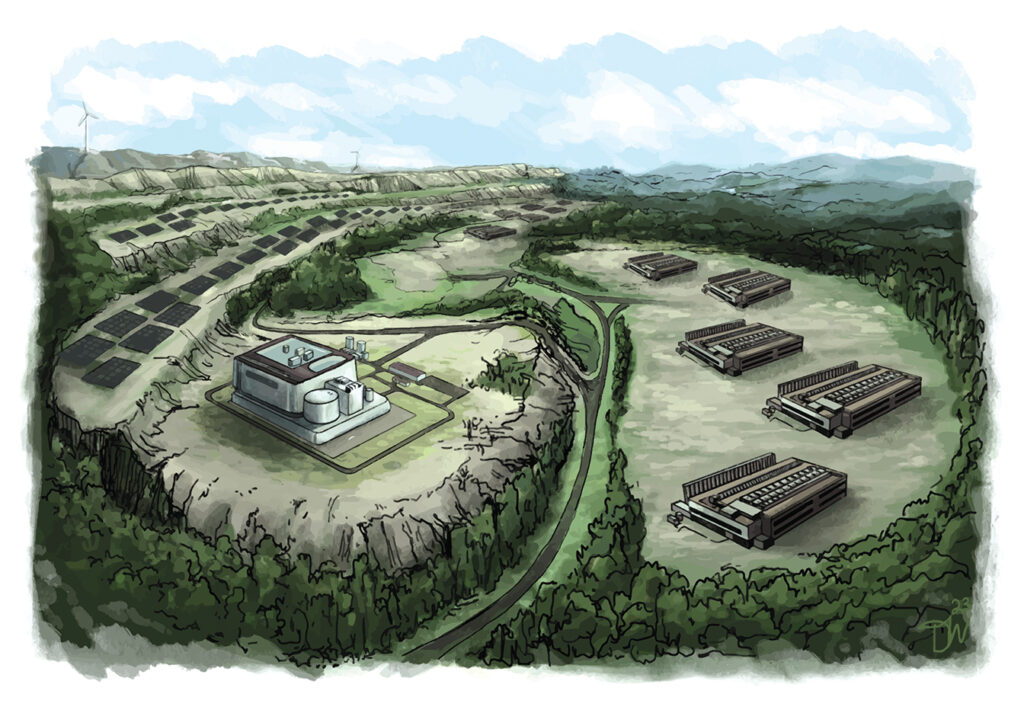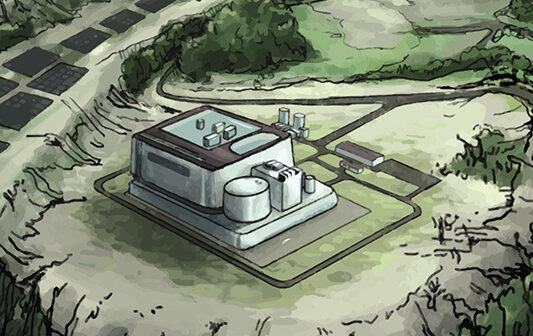
Few would deny that meaningful energy solutions are critical to Virginia’s future and growth. And the commonwealth’s energy revolution continues to be based in its Southwest quadrant.
In late-October, Gov. Glenn Youngkin released a major announcement for the Energy DELTA (Discovery, Education, Learning & Technology Accelerator) Lab, related to a 65,000-acre land deal and rollout of several clean energy projects on former mined lands. The public-private framework will transform the previously mined coal properties in Southwest Virginia.
While noting the Commonwealth’s need for strategic investments to meet a “skyrocketing” power demand, Youngkin said the agreement “aims to transform Southwest Virginia into a proving ground for innovators to secure an abundant and reliable energy future for the Commonwealth.”
The DELTA Lab, in conjunction with Wise County, Va. and Fortune 100 company Energy Transfer, is the primary developer and will partner with energy companies and electric utilities to establish various energy technologies on the reclaimed land. The land deal is one that Wise County — with its significant land, power, and water assets — has previously tried for more than two decades to no avail.
“This agreement will create game changing opportunities that simply did not exist before,” Wise County Administrator Mike Hatfield explained, noting that large portions of the region have often been difficult to develop, given limited access due to private and federal ownership. While most of the land deal’s properties are in Wise County, neighboring Dickenson, Lee, and Scott counties are on the table for development and currently have projects undergoing due diligence.
DELTA Lab leadership worked for two years to develop relationships with Energy Transfer executives while building on its work with the company’s local team. As an outlier in the coalfields, Energy Transfer’s vast land position includes ownership of all surface and subsurface rights, which will be critical to closing a deal.
Current mining operations on the property make it attractive to redevelopment, particularly given federal tax incentives in the Inflation Reduction Act and the Bipartisan Infrastructure Law.
“Coal and natural gas have driven Southwest Virginia’s economy for a century, and there is a growing demand for metallurgical coal, an essential element in steel production,” Energy DELTA Lab Chairman Mike Quillen explained. “The coal industry will continue to play its role in energy and the region’s economic activity while providing talent, assets, developable land, power infrastructure and water resources to lead energy diversification through innovation.”
DELTA Lab’s overarching goal is to help the Commonwealth achieve energy security, while also expediting the deployment of forward-looking technologies.
While wind and solar are essential to any conversation, leaders believe that expanding our nuclear capability is the principal concern, especially considering nuclear energy produced in Virginia now stands at nearly one-third of the commonwealth’s total energy supply. In its bid to be designated a nuclear tech hub by the U.S. Economic Development Administration, the commonwealth has tapped the DELTA Lab to lead its testbed and new technology deployment strategies.
There is encouraging bipartisan praise for the ongoing efforts, too.
Democratic U.S. Senators Mark Warner and Tim Kaine recently said, “We are excited that this agreement between Energy Transfer and Energy DELTA Lab will pave the way for new energy developments on repurposed mined lands, serving as a market-driven solution to ensure Virginia’s energy security,” while Republican U.S. Congressman Morgan Griffith (VA-9) deemed it a “landmark agreement” and added that the DELTA Lab’s innovative development strategy “fits with the concept Congress envisioned when we created the AMLER program” and will “allow the Commonwealth to become a leader in cutting-edge energy production.”
And it is a job creator.
DELTA Lab is currently developing its first three multi-purpose “energy ready” industrial sites in the coalfields, including on land owned by Dallas-based Energy Transfer and managed by Penn Virginia Operating Company, out of Kingsport.
“Energy DELTA Lab’s approach is quite literally the definition of an all-the-above-approach given coal and gas production is occurring concurrently with clean energy deployment across a vast footprint on Penn Virginia property,” said Terry Kilgore, Virginia House of Delegates Majority Leader.
The DELTA Lab’s Data Center Ridge site rollout out with this land announcement — which includes a business model for delivering energy efficiency and cost savings to data centers — builds on four years of work to convert a 400-acre previously mined property to a 1-gigawatt multi-tenant data center campus; this can leverage DELTA Lab’s planned onsite and nearby clean energy developments. The project provides a solution to the unprecedented demand for cloud storage and a secure location considering real estate constraints in Northern Virginia.
“DELTA Lab is the perfect site to deploy any energy intensive process that requires a long-term low carbon solution,” Will Clear, an energy consultant to the DELTA Lab, claimed. “Data Center Ridge is the first example by pairing solar, wind, storage and potentially nuclear with high-demand data centers all on the same property with the added advantage of limitless cool water.”
Additionally, DELTA Lab Business Development Consultant Will Payne said the Lab is engaging with local schools for career awareness in the industry, presenting a model to them for working on projects going forward.
In support of its portfolio of over a dozen projects, the DELTA Lab and its partners are seeking nearly $600 million in federal Department of Energy grants related to specific projects, all leveraged by private capital investment exceeding $8 billion. The application process has been arduous.
“We’re competing nationwide for industry partnerships that will lead to new jobs and unprecedented local tax revenues,” Payne said. “Winning just one of these projects would be a game changer for the region. We’ve put together a compelling business case for a variety of energy technologies to be deployed in Southwest Virginia.”




